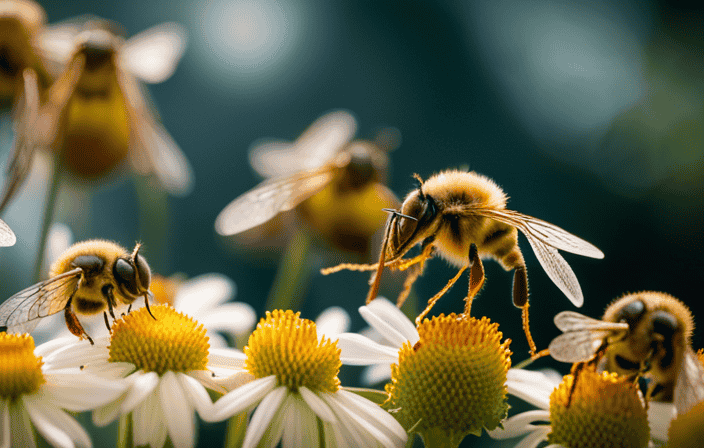While in the dream realm, I realized I was surrounded by the enchanting presence of bees. Their gentle buzz whispered secrets from deep within my mind, unveiling a world brimming with hidden meanings and symbols.
In this mystical realm, bees became messengers of the mind, revealing the intricate tapestry of emotions and desires.
Join me as we delve into the symbolic power of dreaming about bees, unraveling the threads of productivity, abundance, unity, and spiritual guidance that these buzzing creatures bring.
Key Takeaways
- Dreaming about bees can have various interpretations, including representing the fear of escaping responsibilities and commitments.
- Nightmares of being attacked by bees can indicate anxiety and fear, and may suggest an impending event that feels out of control.
- Dreaming of seeing bees can symbolize productivity, abundance, unity, and the need for relaxation and self-care.
- Bees in dreams can also represent divine guidance, spiritual awakening, unresolved issues or conflicts, and provide insight into their spiritual meaning through their color and behavior.
Types of Dreams
Dreaming about bees can have various interpretations and different types of dreams about bees can represent different emotions and situations.
One type of dream that often occurs is being attacked or stung by bees. These dreams can be quite intense and indicate anxiety and fear. They may suggest an impending event that feels out of control or dreaded. Techniques like meditation, creating a calming environment, and practicing yoga can help alleviate these dreams.
Another type of dream is simply seeing bees. This can symbolize productivity and abundance, as bees are known for their hard work and dedication. They also represent unity, community, and relationships. Surrounding oneself with trustworthy individuals can help in achieving success.
Dreaming about bees can hold a spiritual meaning as well, representing productivity, teamwork, and cooperation. Bees can also symbolize divine guidance and spiritual awakening. The color and behavior of the bees in the dream provide insight into their spiritual meaning.
Nightmare Interpretations
Nightmares of being bombarded by buzzing bees can bring about overwhelming anxiety and fear. These intense dreams often leave us feeling helpless and out of control, as if we are being attacked by an unstoppable force. The symbolism behind these nightmares is profound, revealing deep fears and anxieties that we may be harboring in our waking lives. By exploring the spiritual meaning of these dreams, we can gain insight into our subconscious thoughts and emotions.
To further understand the significance of these nightmares, let’s take a closer look at the table below:
| Nightmares of Being Attacked by Bees |
|---|
| Anxiety and fear |
| Feeling overwhelmed |
| Sense of helplessness |
| Symbolic representation of unresolved issues or conflicts |
| Need for self-care and nurturing |
This table highlights the emotional and symbolic aspects of these nightmares, showing us that they can serve as a wake-up call to address our fears and take better care of ourselves. Through introspection and self-reflection, we can find ways to alleviate these nightmares and find inner peace.
Being Attacked/Stung
When I am attacked or stung by bees in my dreams, it triggers intense anxiety and a sense of helplessness. The visuals of being swarmed by a swarm of bees overwhelms me with fear and panic. It feels as if I am being chased by an unstoppable force, unable to escape.
These dreams often signify impending events that I dread or situations that feel out of my control. The bee stings in my dreams serve as a reminder of negative emotions or thoughts that I may be harboring. The location and severity of the stings play a crucial role in the interpretation of these dreams.
Sometimes, these dreams can even result in personal trauma, leaving me feeling unsettled and uneasy. They serve as a wake-up call for me to prioritize self-care and self-nurturing, as well as to address any unresolved conflicts or issues in my life.
Impending Events
Impending events that I dread or situations that feel out of my control trigger intense anxiety and a sense of helplessness when I am attacked or stung by bees in my dreams. The visuals of being swarmed by bees evoke a deep fear and panic within me, as if I am trapped in a situation I cannot escape.
These dreams serve as a powerful reminder of the looming challenges and uncertainties in my life. The intensity of the bee attack reflects the magnitude of these impending events, leaving me feeling overwhelmed and vulnerable. It is a symbolic representation of the struggle I face in navigating through difficult circumstances.
These dreams urge me to find ways to cope with my anxiety and regain a sense of control over my life.
Techniques for Alleviation
To overcome the overwhelming fear of bee attacks in my dreams, I have discovered effective techniques for alleviating anxiety and regaining control over my emotions. When faced with these intense dreams, I have found solace in practicing meditation, creating a calming environment, and engaging in yoga. These techniques help me to ground myself, find inner peace, and reduce the panic that arises from being attacked by a swarm of bees in my dreams.
In my journey of self-discovery, I have learned that these dreams may indicate an impending event that feels out of control. By practicing these techniques, I am able to confront my fears and anxieties head-on, empowering myself to face whatever challenges may come my way. Through meditation, I find clarity and a sense of inner strength. Creating a calming environment allows me to cultivate a peaceful mindset, enabling me to approach difficult situations with a clear and focused mind. And practicing yoga helps me to connect my mind, body, and spirit, fostering a sense of balance and harmony.
In order to provide a visual representation of these techniques, I have created a table below:
| Techniques for Alleviation | Benefits |
|---|---|
| Meditation | – Provides clarity and peace of mind – Allows for self-reflection and introspection – Reduces stress and anxiety |
| Creating a Calming Environment | – Cultivates a peaceful mindset – Promotes relaxation and tranquility – Helps to create a sense of safety and security |
| Practicing Yoga | – Connects mind, body, and spirit – Fosters balance and harmony – Increases flexibility and strength |
By incorporating these techniques into my daily routine, I am able to confront and overcome the fear of bee attacks in my dreams. They serve as a reminder of my inner strength and resilience, allowing me to navigate through life’s challenges with grace and confidence.
Negative Emotions
Negative emotions can arise when I am stung by a bee in my dreams, indicating unresolved conflicts or issues. The bee sting serves as a reminder of unpleasant experiences that I may have buried deep within my subconscious. It is a wake-up call, urging me to confront these unresolved issues and find a resolution.
The intensity and location of the bee sting in the dream offer valuable insights into the specific emotions and thoughts that I may be harboring. It is a symbolic representation of the pain and discomfort that I may be carrying within myself.
By acknowledging and addressing these negative emotions, I can begin the process of healing and finding inner peace. The interpretation of dreams about bee stings allows me to unlock hidden aspects of myself and gain a deeper understanding of my subconscious thoughts and emotions.
Need for Self-Care
When I dream of bees, it reminds me of the importance of taking care of myself and nurturing my own well-being. Bees are incredible creatures that work tirelessly to fulfill their purpose in the hive. In my dreams, they serve as a gentle reminder that I too need to prioritize self-care and self-nurturing. Just like bees gather nectar and create honey, I need to gather moments of joy and relaxation to fuel my own inner happiness. It is easy to get caught up in the busyness of life, but dreaming of bees encourages me to slow down, recharge, and find balance. By taking time for myself, I can better navigate the challenges and responsibilities that come my way. The buzzing of bees in my dreams serves as a symbolic call to prioritize my own well-being and find harmony within myself.
| Column 1 | Column 2 | Column 3 |
|---|---|---|
| Self-Care | Nurturing | Well-being |
| Joy | Relaxation | Inner happiness |
| Balance | Prioritizing | Harmony |
| Recharge | Challenges | Responsibilities |
| Call to action | Symbolic reminder |
Seeing Bees
Seeing bees in my dreams fills me with a sense of abundance and productivity. It’s as if these tiny creatures are reminding me of the power of hard work and dedication. In my dreams, bees symbolize unity, community, and the importance of relationships. They remind me that surrounding myself with trustworthy individuals can lead to success and fulfillment.
The sight of bees buzzing around also serves as a gentle reminder to take breaks and relax amidst the chaos of life. It’s a symbolic invitation to find balance and nurture myself. In the spiritual realm, bees represent divine guidance and spiritual awakening. They remind me to tap into my inner wisdom and trust in the journey of self-discovery.
Dreaming about bees offers a deeper understanding of the interconnectedness of all things and the importance of cooperation.
Productivity and Abundance
In my dreams, the presence of bees fills me with a sense of abundance and reminds me of the importance of productivity. When I see bees buzzing around, I am reminded of their diligent work and dedication to their goals. They symbolize the power of hard work and the rewards that come from it.
Their unity and cooperation in a hive reflect the importance of teamwork and community in achieving success. The sight of bees in my dreams serves as a reminder to surround myself with trustworthy individuals who share the same vision and values.
It also signifies the need to take breaks and relax amidst the busyness of life, as even bees take moments to rest. The symbolic power of dreaming about bees encourages me to embrace productivity and abundance in all aspects of my life.
Unity and Relationships
The presence of bees in my dreams reminds me of the importance of unity and the value of relationships. When I see bees buzzing around in my dreams, it serves as a powerful symbol of the interconnectedness that exists between individuals and the strength that can be found in working together towards a common goal.
Just like bees in a hive, we thrive when we support and rely on one another. The sight of bees in my dreams is a gentle nudge from my subconscious, reminding me to nurture and cultivate my relationships with others, for it is through these connections that we find fulfillment and abundance.
The bees are a reminder to me that when we come together, we can achieve great things and create a harmonious and productive environment.
Spiritual Meaning
As we delve deeper into the symbolic power of dreaming about bees, it is essential to explore the spiritual meaning behind these dreams.
Dreaming about bees represents more than just productivity and teamwork; it holds a profound spiritual significance. Bees are often seen as symbols of divine guidance and spiritual awakening in various cultures. When bees appear in our dreams, they serve as messengers, urging us to prioritize self-care and self-nurturing. These dreams can also be a reflection of unresolved issues or conflicts, as aggressive or stinging bees may indicate.
To further understand the spiritual meaning of dreaming about bees, let us delve into a three-item numeric list:
- Bees as symbols of spiritual growth and fertility.
- The significance of the color and behavior of bees in dreams.
- How interpreting these dreams can unlock hidden aspects of oneself.
Frequently Asked Questions
Can dreaming about bees indicate a need for change or transformation in one’s life?
Dreaming about bees can indicate a need for change or transformation in my life. Bees symbolize productivity, teamwork, and spiritual growth. Their presence in dreams may suggest the necessity to embrace new opportunities and evolve personally and spiritually.
What is the significance of the color and behavior of bees in dreams?
The color and behavior of bees in dreams provide insight into their spiritual meaning. Bees symbolize productivity, unity, and divine guidance. Aggressive bees may represent unresolved conflicts, while dead bees can signify a decline in creativity or social connections.
Can dreams about bees symbolize fertility or the desire to start a family?
Dreams about bees can symbolize fertility or the desire to start a family. Bees are often associated with the concept of growth and abundance, so dreaming about them may indicate a subconscious longing for new beginnings and nurturing relationships.
How can interpreting dreams about bees help in understanding subconscious thoughts and emotions?
Interpreting dreams about bees can unravel hidden aspects of the self. Like an ancient map, dreams guide me through the labyrinth of my subconscious, revealing thoughts and emotions that may be otherwise obscured.
Are there any cultural or historical beliefs that associate bees with specific spiritual meanings in dreams?
There are cultural and historical beliefs that associate bees with specific spiritual meanings in dreams. For example, in some cultures, bees symbolize divine guidance and spiritual awakening, while in others, they represent productivity, teamwork, and cooperation.
Conclusion
In conclusion, dreaming about bees holds a profound symbolic power that speaks to our subconscious thoughts and emotions. Whether it’s the anxiety-inducing nightmares of being attacked by bees or the uplifting visions of seeing bees symbolizing productivity and abundance, these dreams offer a glimpse into our hidden selves.
The location and severity of a bee sting, the presence of a queen bee, or even the act of eating honey all carry significant meaning. So, next time you dream about bees, ask yourself, what messages are they trying to convey?









